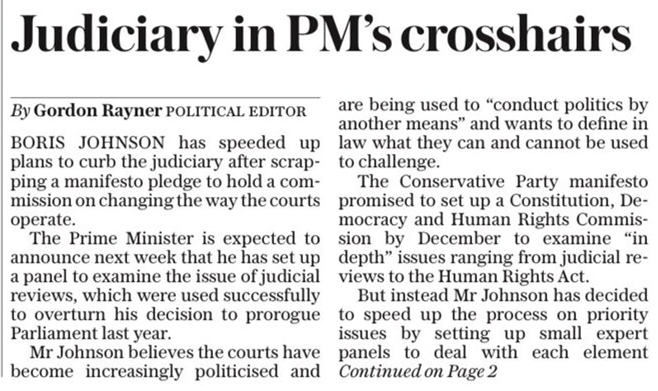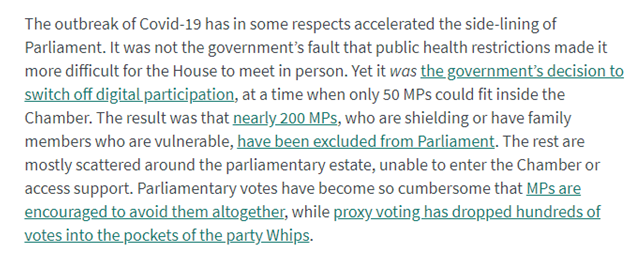According to the @Telegraph "Boris Johnson has speeded up plans to curb the judiciary". We must not be fooled by claims that this is about restoring "the sovereignty of Parliament". It& #39;s about the power of Number 10 to sideline Parliament - & all other checks on its power. THREAD
2. The courts are to be punished for two key rulings: reversing the suspension of Parliament in 2019, & insisting that only Parlt could trigger Article 50. In neither case did the court rule on policy: instead, it restored the right of Parlt, rather than No. 10, to make decisions
3. Far from "supplanting Parliament", as ministers claimed, the judges in these cases were *defending* Parliament against an attempt to sweep it aside. What the courts were challenging was not the sovereignty of Parliament, but the right of Number 10 to shut Parliament down.
4. The prorogation crisis was only the most egregious example of a wider political project: an attempt to exclude Parliament from decision-making and to concentrate power in Number 10. That project has accelerated in the months since prorogation.
5. Parliamentary committees have been suspended, ignored or subjected to heavy-handed attempts to pack their membership and appoint their chairs. MPs who challenged No 10 have been expelled from the Conservative party, while Parliament itself has been rendered almost unworkable.
6. As @davidallengreen , @TomRHickman and others have pointed out, the government has consistently chosen to legislate during the Covid crisis without reference to Parliament, using emergency powers and Statutory Instruments to create new criminal offences by ministerial fiat.
7. Meanwhile, the Brexit process has relied heavily on "skeleton bills", which allow ministers to fill in the details of legislation later. A parliamentary report accused ministers of taking powers of "breathtaking scope", & "seeking powers for convenience rather than necessity".
8. So the attack on the courts is not about asserting "the sovereignty of Parliament" over "the judiciary". It is about dismantling checks on the Executive, which will make it harder to assert the rights of Parliament in future. This has serious implications for our democracy.
9. We might ask: "why does this matter? The government won an election, why shouldn& #39;t it do what it wants?" The answer is not just that scrutiny produces better government. It& #39;s that concentrating all power in the hands of the largest party misunderstands the nature of democracy.
10. The Tories won 43% of the vote in 2019. That entitles them to the loudest voice in our democracy, but it does not entitle them to engorge absolute power, to lift themselves above the law or to shut out other voices - with their own democratic mandates - from decision-making.
11. Talk of a "winner-takes-all" system forgets that *every* MP has won an election: the only election, at a UK-level, in which their constituents can vote. Whether they& #39;re from the Greens or the UUP, every MP has a democratic mandate to share in lawmaking & the scrutiny of govt.
12. A government that demands the right to shut down Parliament; that legislates by decree; that tries to control parliamentary committees; & that punishes the courts for upholding the rights of Parliament, is undermining the democratic representation of millions of voters.
13. So next time you read that that "the Judiciary" is in "the PM& #39;s crosshairs", recognise just what a chilling headline that is. If you& #39;re a Conservative, ask how happy you would be to see these powers in the hands of an opposing party, who might use them for very different ends
14. Checks on govt are not an affront to democracy; they are essential to a democracy that speaks for *all* the people. If we value that model, the task of the next 4 yrs is to defend Parlt, the courts & the very principle of checks & balances from the attempt to sweep them aside
For the quotes in this thread, and for more on this theme, see my article here: https://www.qmul.ac.uk/mei/news-and-opinion/items/prorogation-struck-at-the-very-heart-of-parliamentary-democracy-but-it-was-not-an-isolated-incident-dr-robert-saunders.html">https://www.qmul.ac.uk/mei/news-...

 Read on Twitter
Read on Twitter







